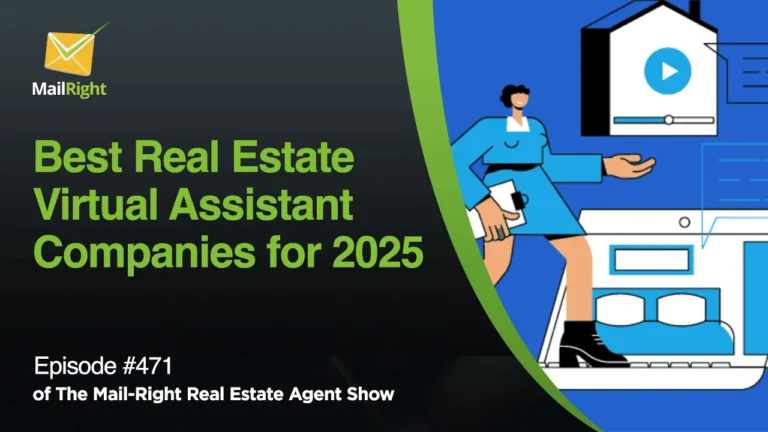For the 384th episode of Mail Right Show, Jonathan Denwood, and Robert Newman explore and discuss the strategies that will effectively work and help real estate professionals in the digital lead in 2023. Robert Newman is the CEO of Inbound REM, an inbound marketing firm, and has worked in the real estate SEO field over the last decade. On the other hand, Jonathan Denwood is the founder and CEO of Mail Right, a platform that combines various digital tools into one convenient, user-friendly package.
Most of the leads generated digitally do not result in an immediate commission payment because many individuals who approach you are not currently seeking to make a purchase. However, they will likely be interested within 6 to 12 months. Therefore, it is crucial to maintain your visibility in their minds by demonstrating your expertise and value to distinguish yourself from others and show that you have something valuable to offer. To achieve this, it is essential to consistently engage with your target audience by developing a plan of action to establish an online presence and ensure that you remain in front of your audience so that when they are ready to hire a real estate professional, you are the person they choose.
Here are effective digital lead strategies you can do in 2023 to keep your online presence.
1. Planed Digital Content
It is a strategy that you map out in advance and share on your social media channels. You plan the content you will create, like video content, so that you maintain your digital presence. You can reutilize the content you’ve produced but ensure consistency. All the content that you planned, you can chop them up and add to your creative content on platforms like Twitter, LinkedIn, and Pinterest. For example, you can take small 30-second video segments that connect to longer pieces of content and then share them. By doing this, you create 10 different paths to engage someone and encourage them to explore further.
2. Social Media With Paid Nurturing
In most social media places, platforms take care of your native reach. When you share something on Instagram, Facebook, or other platforms, the number of people who can view it is limited. Every year, the natural reach of your content is reduced, but you need to be everywhere. Even if you share much content on these social platforms, they decrease the number of people who can see it every month, every six months, and every year, so you’ll need to invest a little money and use retargeting. This means uploading a list of names and emails and then targeting those individuals with your content. It may seem strange to friend someone who has shown interest in your website or content, but retargeting works if you can create a list and then retarget them on social media. However, you’ll have to spend some money, and it doesn’t need to be big so that all the effort you put into your plan of action to achieve omnipresent marketing will yield results.
3. Email
Since the advent of email, the most valuable thing you can have is still an email address. Over a 5 or 10-year timeline, email is still one of the most consistent, reliable forms of marketing tool. Through email, you can send weekly or monthly newsletters about different topics. However, while email is one of the most valuable tools to have in marketing, it needs to be done in the right way, and you need to provide consistent value to get that payoff. Another thing you can do is create a website that will get organic traffic. Once there is visibility, you can install some of the modern AI tools or extensions that will scrape traffic information and grab the email addresses of people who visited your website. And then, if you want, create further marketing redundancies because once you have the email information, you know who’s opening your emails. You can create a list with that information and make advertising campaigns targeting those who have already interacted with your email.
4. Google Displayed Adverts
Market yourself and your service on social media platforms, making yourself visible at a very affordable price to that target audience. Google display advertisements are more affordable than many other online adverts, but their conversion is lower than word-targeting advertising on Google. It is less effective in lead generation, but combining it with other tools previously discussed, especially in a local market, should be considered, and it is also linked to the concept of omnipresence. At some specific times, the ads work well. So, although using it alone is less effective, regardless, there will never be a time when Google ads or adverts, whether they are display ads or text ads, can’t be effective for you.
There is direct advertising in real estate, like search marketing ads where you compete with everyone else, targeting the keyword “homes for sale in Orlando, Florida,” for example. There’s too much competition, and the bidding is intense. The traffic value decreases because there are four or five other people users can quickly check out using the same keywords. However, instead of saying, “I’m just going to say I’m up against everybody else,” try saying, “Are you looking to learn about relocating to Orlando?” or “I’m hosting a free webinar on relocating from Canada to Florida on a specific date.” Use that as a display ad competing with the same keyword, so you’re advertising using the same keyword, but your ad is incredibly unique. And when people start visiting your page, they sign up for a free webinar; you now get traffic interested in learning something.
5. Local Search Services
Google separated local search services and search packs into their own advertising category. So it’s completely separate from the entire ecosphere of other advertising products and services they have. It is still a year into being launched, but it’s one of the best deals available for real estate agents in terms of price and acquisition price.
6. Monthly Webinars
Many people still use the monthly webinar as a lead generation strategy. You can do a podcast where you interview movers and shakers in your local community and then do a monthly webinar about market conditions, proving that you’re an expert. Webinars are incredibly powerful. They’re like the old infomercials, providing space for real estate professionals to educate and tell stories, knowledge, and experience. If you are doing a podcast, you can promote it there and share your webinars through email or social media channels.





